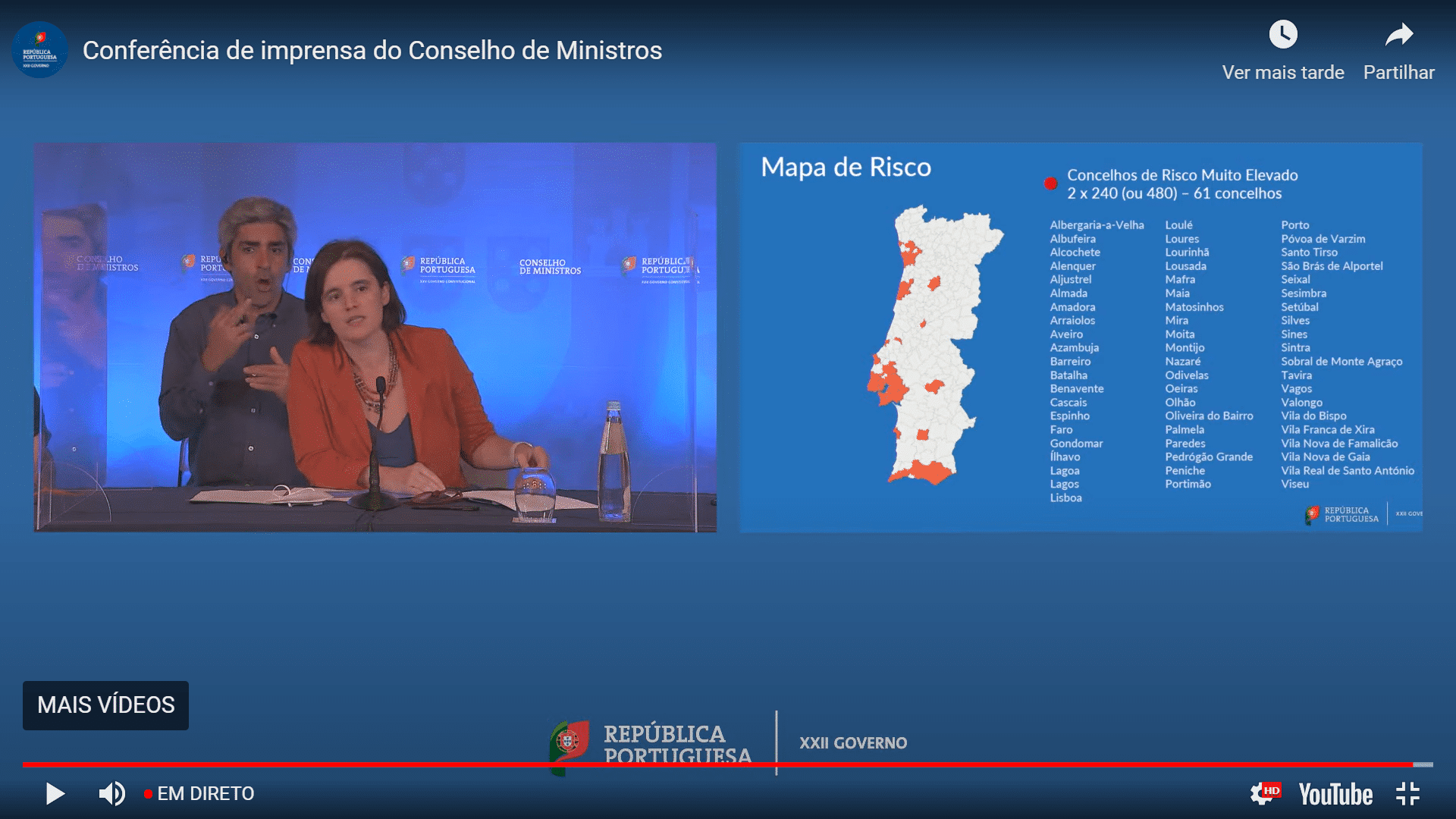Today’s press conference following the weekly Council of Ministers was one of the shortest in recent times, introducing no further measures of combat for the pandemic, now that 116 municipalities are bound by the 11pm curfew and restrictions on restaurants and business hours.
Last week’s meeting bound a total of 90 municipalities to the toughest rules. The new total of 116 means these are the following boroughs affected:
Very high risk: Albergaria-a-Velha, Albufeira, Alcochete, Alenquer, Aljustrel, Almada, Amadora, Arraiolos, Aveiro, Azambuja, Barreiro, Batalha, Benavento, Cascais, Espinho, Faro, Gondomar, Ílhavo, Lagoa, Lagos, Lisboa, Loulé, Loures, Lourinhã, Lousada, Mafra, Maia, Matosinhos, Mira, Moita, Montijo, Nazaré, Odivelas, Oeiras, Olhão, Oliveira do Bairro, Palmela, Paredes, Pedrógão Grande, Peniche, Portimão, Porto, Póvoa de Varzim, Santo Tirso, São Brás de Alportel, Seixal, Sesimbra, Setúbal, Silves, Sines, Sintra, Sobral de Monte Agraço, Tavira, Vagos, Valongo, Vila do Bispo, Vila Franca de Xira, Vila Nova de Famalicão, Vila Nova de Gaia, Vila Real de Santo António, Viseu
Rules for these municipalities remain the same as they were last week. They are:
- Bound by the 11pm – 5am curfew
- Must enforce remote working when business functions permi
- Must close restaurants and cafés by 10.30pm (inside tables with a maximum of four people, terraces with six
- Must bring any cultural shows to a close by 10.30pm
- Must limit sports to those considered low and medium risk
- Must close shops by 9pm during the week. At weekends non-food shops must close by 3.30pm; food shops by 7pm
For municipalities of high risk (see below) the rules are almost the same, with the exception that restaurants can have a maximum of six people per table inside, 10 outside, and shops and businesses can run until 9pm every day of the week.
The high risk boroughs now are: Águeda, Alcobaça, Alcoutim, Amarante, Anadia, Arruda dos Vinhos, Avis, Barcelos, Bombarral, Braga, Cadaval, Caldas da Rainha, Cantanhede, Cartaxo, Castelo de Paiva, Castro Marim, Chaves, Coimbra, Constância, Elvas, Estarreja, Fafe, Felgueiras, Figueira da Foz, Guarda, Guimarães, Leiria, Marco de Canaveses, Marinha Grande, Mogadouro, Montemor-o-Novo, Montemor-o-Velho, Murtosa, Óbidos, Ourém, Ovar, Paços de Ferreira, Paredes de Coura, Penafiel, Porto de Mós, Rio Maior, Salvaterra de Magos, Santa Maria da Feira, Santarém, Santiago do Cacém, São João da Madeira, Serpa, Torres Vedras, Trofa, Valpaços, Viana do Castelo, Vila do Conde, Vila Real, Vila Viçosa and Vizela.
Meantime 29 boroughs are now on ‘alert’: if their transmission levels do not reduce by next week’s Tuesday’s meeting of experts at Infarmed, the likelihood is that these will also join the other 116 under reinforced measures.
The boroughs on alert are: Aljezur, Almeirim, Almodôvar, Amares, Beja, Bragança, Celorico de Basto, Cinfães, Cuba, Entroncamento, Esposende, Évora, Freixo de Espada à Cinta, Mealhada, Miranda do Douro, Mirandela, Montalegre, Moura, Odemira, Oliveira de Azeméis, Pombal, Ponte de Lima, Póvoa de Lanhoso, Resende, São João da Pesqueira, Tomar, Torres Novas, Vale de Cambra, Vila Pouca de Aguiar.
For the Algarve as the nation’s prime holiday destination, the situation has changed, but only slightly. Last week all but two of the 16 municipalities fell within either ‘high’ or ‘very high’ transmission brackets (Aljezur and Alcoutim), now Alcoutim’s has reached ‘high’ while Aljezur is on ‘alert’ and in danger of seeing new restrictions (the municipality currently has 11 active cases, but 15 overall over the last 14 days), and Monchique has recovered from its previous pegging at elevated transmission to moderate.
Summing up the country’s situation, minister for the presidency Mariana Vieira da Silva said: “We are already seeing areas that were more ‘red’ than we find them now. Some regions appear to have reached their peak, like Lisbon and the Azores. We cannot say we are in a situation without a level of concern but it is a good sign that results from the capacity to contain the pandemic and the efficiency of vaccination. It is a race against time”, she concluded – referring to the focus on vaccinating as many people as possible to reach the longed-for point of ‘herd immunity’.
Portugal’s State of Calamity has been extended for a further two-week period, to August 8.




















